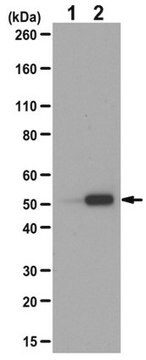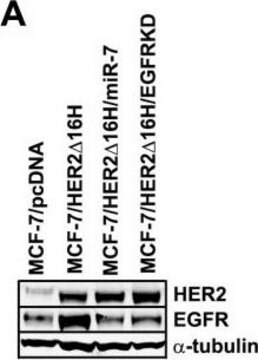ZRB2073
Anti-α Tubulin Antibody, clone 2F2 ZooMAb® Rabbit Monoclonal

recombinant, expressed in HEK 293 cells
Sinonimo/i:
Alpha-tubulin 3E, Tubulin alpha-3E chain
About This Item
Prodotti consigliati
Origine biologica
rabbit
Livello qualitativo
Ricombinante
expressed in HEK 293 cells
Coniugato
unconjugated
Forma dell’anticorpo
purified antibody
Tipo di anticorpo
primary antibodies
Clone
2F2, recombinant monoclonal
Descrizione
recombinant, expressed in HEK 293 cells
Nome Commerciale
ZooMAb® learn more
Forma fisica
lyophilized
Purificato mediante
using Protein A
Reattività contro le specie
rat, human, monkey, mouse
Confezionamento
antibody small pack of 25 μL
Caratteristiche più verdi
Waste Prevention
Designing Safer Chemicals
Design for Energy Efficiency
Learn more about the Principles of Green Chemistry.
Convalida avanzata
recombinant expression
Learn more about Antibody Enhanced Validation
sustainability
Greener Alternative Product
tecniche
affinity binding assay: suitable
flow cytometry: suitable
immunocytochemistry: suitable
immunohistochemistry: suitable
western blot: suitable
Isotipo
IgG
Sequenza dell’epitopo
C-terminal
N° accesso ID proteina
N° accesso UniProt
Categoria alternativa più verde
Condizioni di spedizione
ambient
Temperatura di conservazione
2-8°C
Informazioni sul gene
human ... TUBA3E(112714)
Descrizione generale
Specificità
Immunogeno
Applicazioni
Evaluated by Western Blotting in HeLa cell lysate.
Western Blotting Analysis: A 1:10,000 dilution of this antibody detected Tubulin in HeLa cell lysate.
Tested Applications
Western Blotting Analysis: A 1:10,000 dilution from a representative lot detected Tubulin in lysate from A431 cells and 1:1,000 dilution in lysates from C6, NIH3T3, and COS-7 cells..
Affinity Binding Assay: A representative lot of this antibody bound Tubullin peptide with a KD of 1.8 x 10-7 in an affinity binding assay.
Flow Cytometry Analysis: 0.1 µg from a representative lot detected Tubulin in one million Hela and A431 cells.
Immunocytochemistry Analysis: A 1:100 dilution from a representative lot detected Tubulin in A431, HeLa, HUVEC, and NIH3T3 cells.
Immunohistochemistry (Paraffin) Analysis: A 1:1,000 dilution from a representative lot detected Tubulin in Human testis tissue sections.
Note: Actual optimal working dilutions must be determined by end user as specimens, and experimental conditions may vary with the end user.
Descrizione del bersaglio
Stato fisico
Ricostituzione
Stoccaggio e stabilità
Altre note
Note legali
Esclusione di responsabilità
Non trovi il prodotto giusto?
Prova il nostro Motore di ricerca dei prodotti.
Codice della classe di stoccaggio
11 - Combustible Solids
Classe di pericolosità dell'acqua (WGK)
WGK 2
Punto d’infiammabilità (°F)
Not applicable
Punto d’infiammabilità (°C)
Not applicable
Certificati d'analisi (COA)
Cerca il Certificati d'analisi (COA) digitando il numero di lotto/batch corrispondente. I numeri di lotto o di batch sono stampati sull'etichetta dei prodotti dopo la parola ‘Lotto’ o ‘Batch’.
Possiedi già questo prodotto?
I documenti relativi ai prodotti acquistati recentemente sono disponibili nell’Archivio dei documenti.
Protocolli
Follow this short antibody reconstitution protocol and see how easy it is to reconstitute ZooMAb® recombinant antibodies.
Il team dei nostri ricercatori vanta grande esperienza in tutte le aree della ricerca quali Life Science, scienza dei materiali, sintesi chimica, cromatografia, discipline analitiche, ecc..
Contatta l'Assistenza Tecnica.








